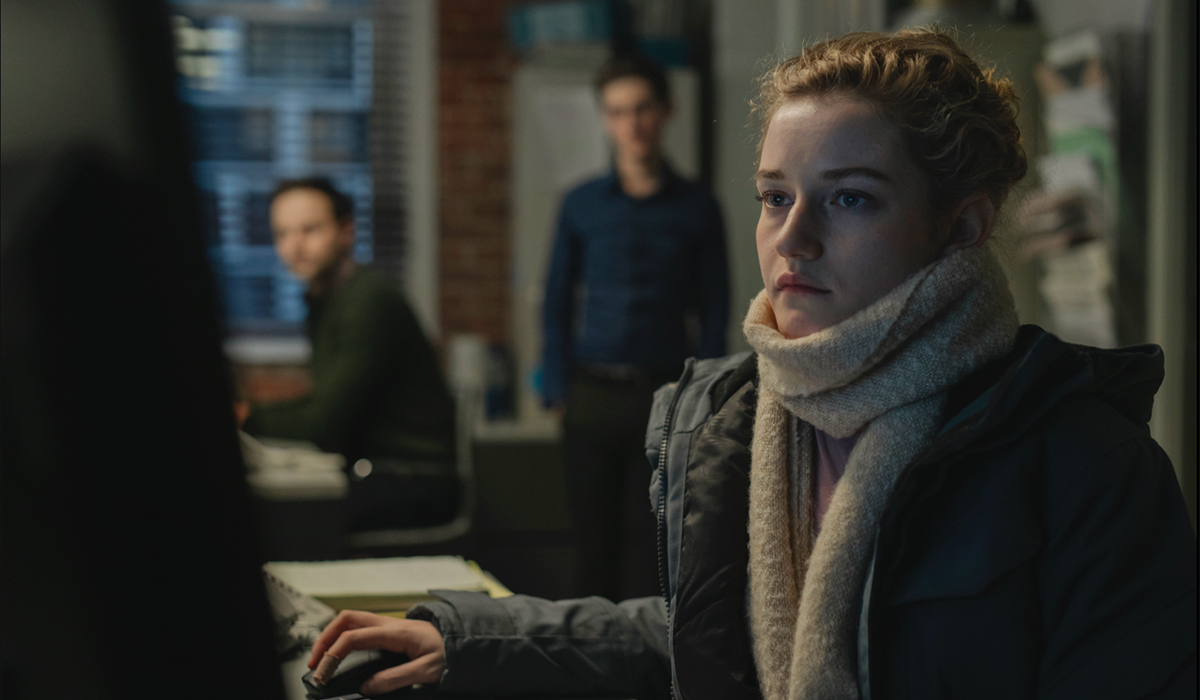Most people feel like they’ve worked in an oppressive environment at one time or another. For men, that usually means in terms of ideas and personal growth. For women, it’s MUCH different. The Assistant should be viewed by all people, especially men, in positions of power who think burying their head in the sand does not contribute to a toxic work environment. When you see Jane’s (Julia Garner) face, any person with empathy in their heart will know the pain and fear that poor girl goes through on a day to day basis, with no person around to provide her any comfort whatsoever.
Jane is a go getter. She’s a Northwestern University graduate with a high GPA, working for a film production company in a big city. She gets up hella early, drives from some crazy far off location to get to the office before anyone, starting the coffee, turning on all the lights, printing out the main meeting information for all the bosses. But as we immerse ourselves in her day-to-day work, stuff seems off. Picking up earrings in the boss’s office. Dealing with the wife of an important employee. Very young girls going in to audition. Julia, noticing no one’s doing anything, tries to reach out to anyone who’ll listen, which, unfortunately, is not a lot of people.
The success of The Assistant relies on how sinister it can be to watch an innocent person normalize the pervasive environment poor Jane has to go through. How does a toxic work existence get normalized? Writer/director Kitty Green takes the subtle approach. We spend the first 20-30 minutes with Jane and her work day. It’s kinda crappy; she’s in hella early from really far away, doing that work we all hate when we start from the bottom, emphasizing how robotic and accepting Jane is doing the work given by her 2 immediate male bosses. Fine: even Jane was probably aware of the annoying b*tch work she’d have to do. THAT she could live with. But lumped into that work is the waterfall of power abuse, like say, a wife calling in about not being able to use company funds for personal gain. And when the wife gets mad and yells at Jane, her husband, the most powerful man in the building, just unloads over the phone on poor Jane later, forcing JANE to apologize to him. That apology is reworded and neutralized by her immediate male bosses. And through all of this, Jane possesses this calm despair that just makes you feel terrible for a girl put in a truly terrible position, and even worse because she’s not upset, like this has probably happened to her a few times before. She just continues to go about her day, listening to employees talk about not sitting on the couch, or female employees talking about not being promoted.
The subtext becomes more textual as the gray areas become more clearly black and white. Jane probably can look the other way when it comes to herself, cause she can take it. But when a really young girl is booked in an audition at the CEO’s hotel room for most of the afternoon? While it’s troubling all other management might be able to look the other way, Jane decides to act, going to HR. Also, conveniently, managed by a man. That HR meeting walks the line between surreality and reality, but it succeeds more often than not, mostly on the acting of Julia Garner, who conveys a host of despondent emotions, realizing that her voice will be silenced, and no one exists to protect the powerless. The ending then goes back to Green’s poignant subtlety, where we see why Jane might be convinced to not just up and quit her job, and cement the full cycle of an abusive situation. It’s heartbreaking, infuriating, and most importantly all too commonplace as the #MeToo movement has pointed out.
The Assistant is stressed out, wondering when time will be up for toxic work environments like this one. But thanks to Kitty Green and Julia Garner for giving some voice to those people living in fear of their situation, feeling stuck and perpetually stressed and compromised because of the cruel power structures. Thanks to the MeToo and TimesUp movements, and movies like Bombshell and The Assistant, your voices have somewhere to go. And to all the people in power in these places, please, listen, and pay attention. Putting your head down only perpetuates the problem.

